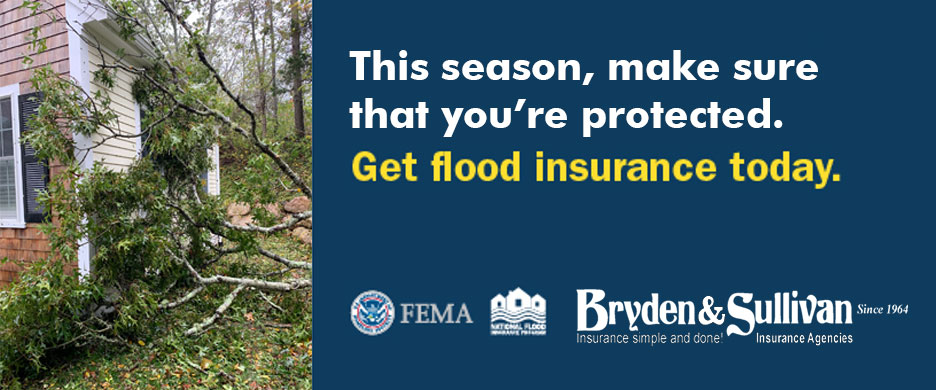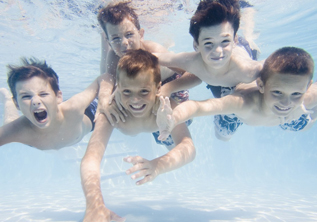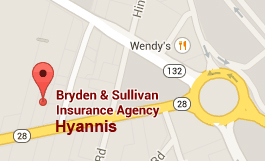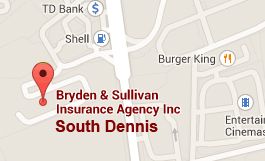Storm Preparedness
Seasonal (and even un-seasonal) storms are always a possibility, as well we know on the Cape and along the coast. FEMA’s National Flood Insurance Program (NFIP) is encouraging property owners to reach out to Bryden and Sullivan to raise awareness about hurricane and windstorm risk on Cape Cod.
It’s also time to do an insurance checkup to determine if you are renewing an existing plan, updating to a new one, or signing up as a new client. Bryden and Sullivan reminds you that it takes 30 days for a Flood Insurance policy to kick in.

Whether it’s a major flood or just an inch of water, flood insurance helps cover the cost of flood damage. Just one inch of water in an average-sized home can cost up to $25,000 in damage. Most homeowners and renters policies typically do not cover flood damage.
Bryden and Sullivan and NFIP recommend these storm preparedness tips:
- Know the risk. Know what the upcoming hurricane season may bring and how your home(s) may be impacted.
- Conduct an insurance checkup. Review your current flood insurance coverage to ensure there is no lapse. If you don’t have flood insurance, it is crucial to secure coverage now, since policies typically take 30 days to go into effect.
- Store important information. Locate and store insurance policy information and other important papers in a watertight container, a safe deposit box, or another secure location outside the home.
- Reduce potential damage. Move valuables to higher levels, clear gutters and drains of debris and install check valves to keep pipes from back flowing.
Bryden and Sullivan looks forward to partnering with you to financially protect your home from future flood damage.
Questions? Call or email us directly!
7 Common Car Accidents and How to Help Avoid Them

Woman behind the wheel of her car putting her cell phone in the center console
Let’s face it: accidents happen. And when they do, you might be looking at car repairs and injuries as well as possible increases to your insurance premium. Safe driving can go a long way in keeping you and your family safe and your premium in check. Here are seven common car accidents and tips on how to help avoid them:
- Rear-end Collisions
Rear-end collisions are a common reason for auto insurance claims. Whether you are the driver who hits a vehicle in front of you, or the driver who gets hit by a vehicle behind you, these accidents can often be avoided. Consider these tips: Keep your distance. Drive far enough behind the car in front of you so you can stop safely. This is especially true in inclement weather. Stay at least three seconds behind the vehicle ahead of you, and longer if you’re in a heavier vehicle. Extend the timing when weather conditions are bad. Drive strategically. Avoid situations that could force you to suddenly use your brakes. If a driver is following you too closely or isn’t paying attention, you might be rear-ended. Don’t get distracted. Never take your eyes off the road to eat, read a text message or find your phone. If the driver ahead of you stops suddenly, it only takes a second or less of not paying attention to rear-end their vehicle. Don’t drive when drowsy or under the influence. You’re more likely to make driving errors when you’re sleepy or impaired by drugs or alcohol. - Parked Car Damage
Another common cause of auto damage: having a parked vehicle hit by another car. Whether you’re leaving your car in a parking lot or on the road, take steps to help avoid parked car collisions and claims. Here are some suggestions: Go the distance. Don’t park in the busiest part of a parking lot. Instead, select a space away from heavy traffic. You’ll help reduce your chance of getting hit by another car. Maximize the space. Always park in the center of a spot. Reposition your vehicle if it’s too close to a parking line. It will help keep your car from being hit by others pulling in to or out of adjacent spots. It can also help prevent dings from swinging doors. Park in a garage, if you can. The idea is to put your car in a safe place when you’re not driving it. Park street-smart. Try not to park near busy intersections, tight turns and driveways. Other drivers may not see your vehicle and could side-swipe it when passing by. - Single-vehicle Accidents
Single-vehicle losses include collisions with road barriers, debris or animals, in addition to rollovers and accidents when driving off-road. It’s not hard to help prevent them. Drive right for the weather. Even if yours is the only vehicle on the road on a rainy, snowy or icy day, drive at speeds that allow you to maintain control. Learn how to avoid hydroplaning on flooded roads and refresh your winter driving skills before the season begins. Always pay attention. Just because you’re the only person on the road doesn’t mean it’s okay to text, make hands-on phone calls or eat while driving. You never know when conditions might change. Don’t drive too fast. Speeding has been involved in approximately one-third of all motor vehicle fatalities for more than two decades.1 Simply put, speeding is dangerous, even if there is no one else around you. - Windshield Damage
Chips and cracks to vehicle windshields are a common auto accident that many drivers don’t realize they can help prevent. Most windshield damage happens when rocks and stones are thrown up in the air by other vehicles. Help prevent this damage by keeping your distance from cars and trucks. Also, don’t drive behind snow plows when they’re dropping salt or other granular substances. Some pieces are large enough to cause chips and cracks. - Crashes at Intersections
Intersections are another place where accidents frequently occur. Distracted drivers may miss traffic signals changing from green to yellow to red. Or they don’t notice vehicles pausing before making turns. Practice defensive driving to help avoid accidents. Take a moment after the light turns green to make sure no one is coming through the intersection. Look out for drivers speeding to make it through a yellow light on a cross street. When you’re approaching a yellow light, be cautious rather than take chances. - Parked Vehicle Theft
No matter where you park your car, there’s always a chance of a break-in. Still, there are things you can do to help prevent potential unnecessary damage to your vehicle. Keep in mind that items stolen from your vehicle could be a loss that you file under your homeowners insurance coverage. Damage that occurs to your vehicle during a break-in would be filed under your auto insurance coverage. Never leave valuables in a parked car. Having them in view is an invitation to thieves. Take expensive things with you, store them inside your glove compartment or lock them in the trunk. Never park in dark locations. Instead, find spaces in well-lit areas. Plan ahead if you’re parking prior to sunset. - Backing Collisions
Whether you’re backing out of a parking spot or your driveway, accidents can happen. The best thing you can do to avoid accidents when backing up is to avoid having to back up in the first place. When possible, park in a way where you won’t have to back up into traffic, such as pulling through or backing into a parking spot. Another helpful tip: drive vehicles that have a backup camera. If your car doesn’t have one, you can have one installed. If you drive a car that’s not equipped with a backup camera, here are some other suggestions of what you can do:
- Before getting into your vehicle, look around to assess your surroundings and traffic patterns.
- Back out using the shortest, most direct route possible.
- Reverse in a straight line, turning only when clear of parked vehicles or any other obstructions.
- Back out slowly while continuing to check traffic around you.
- Use your mirrors and brakes until you’re completely out of the spot and integrated into traffic.
- Never do anything distracting while backing out.
While there are many things you can do to help prevent collisions, theft, injuries or damage to your vehicle, it’s not always possible to avoid the unexpected. Contact your local independent agent or a Travelers representative to make sure you have appropriate coverage to meet your needs.
Sources: 1 https://www.nhtsa.gov/risky-driving/speeding
Trouble with Auto Registration Renewals on Cape Cod?
If you are having trouble renewing your auto registration on Cape Cod, you aren't the only one.
The Registry requires appointments. To arrange directly with the Registry, please click here:
https://www.mass.gov/orgs/massachusetts-registry-of-motor-vehicles
Bryden and Sullivan has special software and can do it for you in only minutes for a $20 fee.
This testimonial arrived today:
Tarin is amazing by the way! I procrastinated on my renewal and it expires tomorrow and they just got it renewed for me in 10 minutes. Awesome service, thank you.
Matthew J Petti
Important Workers Compensation Information on Furloughed Employees
Please be advised that the Division of Insurance has approved a new Workers Compensation class code #0012 with a rate of $0.00 for employers that paid furloughed employees due to COVID-19.
Bryden and Sullivan Website is now ADA-Compliant
![]() Bryden and Sullivan firmly believes that the Internet should be available and accessible to anyone, and is committed to providing a website that is accessible to the widest possible audience, regardless of circumstance and ability.
Bryden and Sullivan firmly believes that the Internet should be available and accessible to anyone, and is committed to providing a website that is accessible to the widest possible audience, regardless of circumstance and ability.
To fulfill this, BrydenandSullivan.com aims to adhere as strictly as possible to the World Wide Web Consortium’s (W3C) Web Content Accessibility Guidelines 2.1 (WCAG 2.1) at the AA level. These guidelines make web content accessible to people with a wide array of disabilities. Complying with those guidelines helps us ensure that the website is accessible to all people: blind people, people with motor impairments, visual impairment, cognitive disabilities, and more.
For more information, or to receive a free report on the compliance level your own website, please go to ShorelineADA.com.
See Bryden and Sullivan's Certificate of Compliance.
Local Closings and Announcements
See the Hyannis Chamber of Commerce website for frequently-updated list of event closings, as well as resources for employees and businesses affected by the Coronavirus Emergency.













